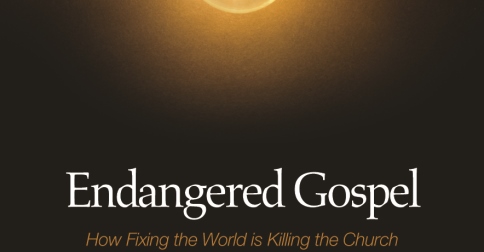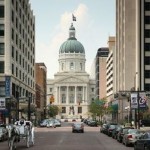 I spent the bulk of last week at the Christian Community Development Association’s annual conference, which was held here in Indianapolis this year. The CCDA conference is always a great opportunity to see old friends from around the country who are engaged in good, reconciling work in their places, and I was excited to be a part of the host team for this year’s gathering.
I spent the bulk of last week at the Christian Community Development Association’s annual conference, which was held here in Indianapolis this year. The CCDA conference is always a great opportunity to see old friends from around the country who are engaged in good, reconciling work in their places, and I was excited to be a part of the host team for this year’s gathering.
For the vast majority of the week, I was hunkered down in the CCDA bookstore, which The Englewood Review of Books ran again this year, but thanks to my brothers and sisters of Englewood Christian Church who helped in running the bookstore, I did get out to a few seasons over the course of the week. Here are a couple of Slow-Church-related observations from the week:
1) There is a deep interest in conversations related to Slow Church, about place, stability, culture, agriculture and food. There was a good deal of curiosity about the Slow Church fliers and bookmarks we were handing out in the bookstore. Even more telling, however, was that our best-selling books (not including those of keynote speakers or Bob Lupton’s brand new Toxic Charity, which was timed for release at CCDA) were Jonathan Wilson-Hartgrove’s The Wisdom of Stability and a variety of Wendell Berry’s books. We hosted an off-site workshop on Saturday afternoon at Englewood Christian Church, and had some good conversations about a number of the facets that John and I are describing here as Slow Church, including stability, and the possibility of an economy that rejects assumptions of scarcity and is instead founded upon the super-abundant grace of God (a topic that I hope to write more about later this week.)
2) At the same time, there is still, in the CCDA audience, a deeply engrained activism that believes that our first course of action should be to change public policy. This was exemplified for me in the debate between Jim Wallis, of Sojourners, and Arthur Brooks,of the American Enterprise Institute. (Click here to listen to a clip that reflects the overall tenor of the debate). Both speakers raised some good points about human nature and the recent economic crises, but neither had much imagination for the idea that God is reconciling all things through the Church, communities that embody the shalom of Jesus in their particular places. Frankly, most of the Wallis-Brooks conversation hovered way up in the stratosphere of ideals, and focused mostly on how we got into the mess we are in, especially the increasing economic disparity, but when there were hints of how these issues could be resolved, both speakers seemed to point toward to large-scale, Washington-style solutions, and unless I’m mistaken, the church was not mentioned once in the debate.
The primary focus of Slow Church is the faithfulness of the Church as placed communities in particular contexts. One of the grand failures of the modern, industrial age is the attempt to provide grand, generic solutions that fit all (or at least a wide swath of) contexts. And these are precisely the sorts of solutions that Wallis and Brooks want to offer up; their assessments of social and economic problems and visions of how these injustices might be righted are mired in a dying way of thinking about the world. As Wendell Berry has argued, we need grassroots solutions that are attentive to local communities and places. Public policies will eventually change, but our primary focus must be on living a different way in our particular places with the brothers and sisters of our church communities and with our neighbors as well. Jonathan Wilson-Hartgrove makes this point eloquently in a recent Huffington Post piece about the Occupy Wall Street movement:
Clearly, those vying for power to shape the world-to-come are legion. And they will inevitably disagree on ways and means in the human struggle that we are facing. But for many of us who believe that another world is already interrupting the status quo, the most important thing isn’t to occupy the centers of power and insist on economic reform. The crucial thing is to carve out spaces where we can begin to create a new society within the shell of the old.
…
The power of Benedict’s Rule was this: in a world that was falling apart, it gave structure to small communities of faith that could experiment in a new kind of community. It did not aim to restore Rome to its former glory or even to reform the church. The Rule simply offered people a way to live a vision of life together rooted in service, humility, and love. Throughout the Dark Ages, the Rule guided communities that existed as points of light in a sea of dark despair. By some estimates, it was the monks who saved civilization. At the very least, they established hospitals and sowed the seeds of democracy in Western culture.
In his now classic analysis of Western civilization, After Virtue, philosopher Alasdair McIntyre wrote that ‘we are not waiting for Godot, but for a new and doubtless very different Saint Benedict.’ But maybe it’s time to stop waiting. Maybe we should turn our attention to the small communities of people who believe another world is possible and have invested their whole lives in that conviction. Maybe it’s time to end the occupation and begin living a new economy in the places where we are.
(emphasis added)
I appreciate the diversity of CCDA, and the unanimous longing for the just shalom of God, but we need to be careful that our means fit our ends, wielding the sword of power will only create new injustices, no matter how pure our intentions. What we need, and what God calls us to be are faith communities whose very life together in their particular places are beacons of hope in a darkening age.











